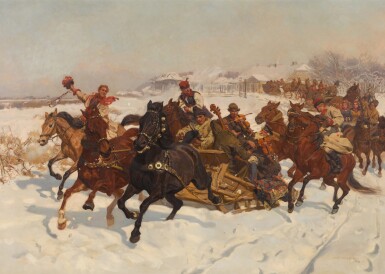European & British Paintings Day Auction
European & British Paintings Day Auction
Property from a Private Collection
Józef Chełmoński
A Kulig
Auction Closed
July 4, 02:11 PM GMT
Estimate
300,000 - 500,000 GBP
Lot Details
Description
Property from a Private Collection
Józef Chełmoński
Polish
1849 - 1914
A Kulig
signed and dated JOZEF CHELMONSKI / 1884 lower right
oil on canvas
Unframed: 125.5 by 176cm., 49½ by 69¼in.
Framed: 141.3 by 191.5cm., 55½ by 75½in.
We are grateful to Tadeusz Matuszczak for endorsing the attribution to Józef Chełmoński. To be included in the forthcoming catalogue raisonné (no. 124).
Antoni Maryanowski, London, by 1951
J. Kamiński, Toronto, by 1960
Richard Green, London, by 1977
Acquired from the above by the present owner
Paris, Salon, 1884, no. 517 (as Le Carnaval en Pologne)
New York, The Kościuszko Foundation, The Fifth Annual Exhibition of Paintings by American Artists of Polish Descent jointly with Selected Polish Painting from 1793 to 1939, 1951, no. 5 (as Wedding Party Coming from Church (Kraków region), lent by Antoni Maryanowski, London)
New York, The Kościuszko Foundation, on loan, 1965
A Kulig encapsulates the key elements of Chelmonski’s artistic idiom - dynamism, expression, motion and picturesque costumes. Sleighs charge through the snow on a crisp winter's day, music plays and riders celebrate. The powerful horses are depicted with care and skill, coats glimmers and determination is palpable in their faces. These traditional sleigh parties, particularly popular amongst the nobility, were also depicted by Alfred Wierusz-Kowalski and Czesław Wasielewski
Born in Boczki, a small village near Lowicz in central Poland, Chelmonski learned basic drawing technique from his father. At the age of thirteen, he began training with Wojciech Gerson at the Warsaw School of Drawing and - thanks to the assistance of fellow Polish artist Josef Brandt - continued his studies at the Munich Academy of Fine Arts.
In 1875 Chelmonski moved to Paris where he developed an impressive international reputation through the promotional efforts of his dealer Adolphe Goupil. By the late nineteenth century, Chelmonski's compositions were eagerly sought by many prominent British and American collectors who coveted the artist's depictions of Polish peasant life and of Troikas and Chetverkas (threesomes and foursomes) galloping across the steppe in particular.
You May Also Like













